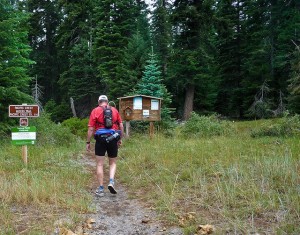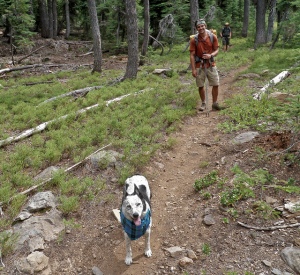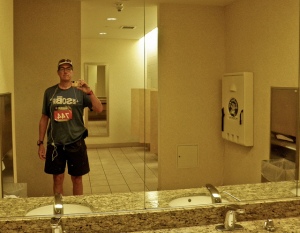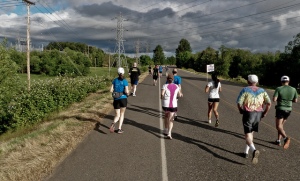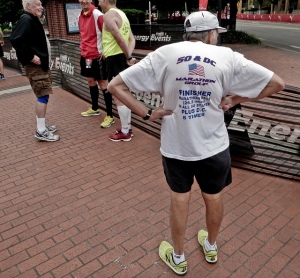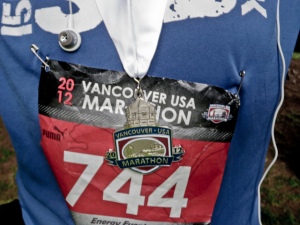I live near the Pacific Crest Trail. The famous, fabled, fabulous PCT. Just about twenty-five miles away. You can look out our back window and stare lovingly at the mountains where it courses through the Sky Lakes Wilderness.
Although I come off in this blog as a marathoner, or an ultrarunner, what I really enjoy more than anything is trail running (and mountain biking – but mountain biking is forbidden on the PCT so forget about that). I simply love trail running and hiking, especially in the local Sky Lakes Wilderness and Mountain Lakes Wilderness; and the best part of being at my level of fitness and health is being able spend a weekend day doing a ten, fifteen, or even a twenty mile trail run. Although it is a slog now because of the atrial fibrillation I still love it – I love the movement through the wilderness and I love the trail itself.
Usually the only one who goes with me is my little trail dog – Ringo.

Ringo on the PCT at Brown Mountain
At this time of year – late Summer – all the thru-hikers, or I should say the small percentage that have made it this far, are coming through Southern Oregon. Most thru-hikers are traveling from South to North; they start at the Mexican border and hike through California, Oregon, and Washington with the goal of reaching the Canadian border. There are a lot of hazards along the way that can cause hikers to drop out and fail to finish – including blisters, running out of money, running out of time, deep snow, diarrhea, boredom, and forest fires.
I try to spend time on the PCT this time of year and will often photograph thru-hikers and post the photos on my flickr page.
In addition to trail running on the PCT I am also an “armchair traveler,” meaning I’ve read a bunch of books about thru-hiking the PCT, including:
Cactus Eaters by Dan White – probably the best written PCT book and my most recent read.
Cascade Summer by Bob Welch – a middle aged Oregon newspaper writer hiked just the Oregon section. This might be more my speed.
Wild by Cheryl Strayed – the most well known and popular PCT book that will undoubtedly get more people on the trail. Also a well written and engaging read.
A Blistered Kind of Love by Angela Ballard – fascinating dual journal by a couple thru-hiking the PCT. It was interesting how the different genders report their trail experience. The male writes about where they went and what they did, and the woman writes about how she feels.
Skywalker – Highs and Lows on the Pacific Crest Trail by Bill Walker – the most endearing and charming PCT book ever.
Pacific Crest Trail Hiker’s Handbook by Ray Jardine – groundbreaking and controversial – Ray clearly changed the way people approach long distance hiking.
A Long Walk by Hap Vectorline – a whimsical journal of a partial through hike that started at the Canadian border and made it as far as Oregon.
In addition to the books I read various PCT blogs, and many of the youtube videos as well.
My dream is to someday thru-hike the PCT – but I don’t think it will ever happen for a number of reasons. I’m certainly in good enough shape, and strong enough, but at 53 am I too old? I don’t think so – I’ve met plenty of thru-hikers that were middle-aged. They tell me they are slower and have to leave earlier and hike longer to keep up – but that would be no problem. I think hiking for that long on anticoagulants might be an issue. On Pradaxa falling just isn’t what it used to be! The main problem is, of course, finding the time. I work full time and just don’t have the resources to take six months off from work.
Maybe some day I could just thru-hike the Oregon section. Or maybe just the Sky Lakes Wilderness (fifty-one miles) – that could be done in a weekend. Why not?
But I still love running in the Sky Lakes Wilderness. As far as falling out on the trail and bleeding out, or having a stroke out there, or being eaten by a bear, or whatever, I like to say that I’d rather die in the Sky Lakes Wilderness than in the Sky Lakes Medical Center.*
*Our local hospital, where I am on the surgical staff, is the Sky Lakes Medical Center. I like our hospital – I’m just saying that I’d prefer to die with my sneakers on, so to speak.

